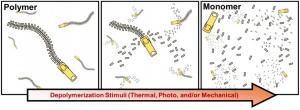New framework could transform plastic waste into reusable building blocks
GA, UNITED STATES, November 26, 2025 /EINPresswire.com/ -- The accumulation of plastic waste continues to challenge environmental sustainability worldwide. Depolymerization, which breaks polymers back into their monomer building blocks, offers the potential for true circular recycling in which materials can be reused without loss of performance. However, progress in the field is slowed by inconsistent reporting practices, making it difficult to compare methods and evaluate industrial feasibility. This study highlights the need for standardized metrics to assess depolymerization efficiency, monomer purity, process energy requirements, and the feasibility of reusing recovered monomers. By consolidating strategies driven by thermal, photochemical, and mechanical stimuli, the authors provide a unified framework to accelerate technological development and support sustainable polymer lifecycles.
Traditional mechanical recycling often downgrades polymer quality, producing materials with inferior strength, durability, and stability. Meanwhile, global plastic production continues to rise, increasing strain on waste management systems and contributing to pollution across terrestrial and marine environments. Depolymerization presents an alternative by enabling the recovery of original monomers for reprocessing into high-value materials. Yet, researchers currently use different experimental parameters and evaluation criteria, resulting in fragmented data and limited reproducibility across the field. This lack of standardization restricts the identification of promising pathways and impedes movement toward scalable circular recycling. Because of these challenges, deeper investigation into standardized performance evaluation and reproducibility in depolymerization is urgently needed.
Researchers from University of Freiburg, University of Freiburg, and University of Freiburg copublished a perspective (DOI: https://pubs.acs.org/doi/10.1021/prechem.5c00080) in Precision Chemistry that reviews emerging depolymerization approaches and proposes a standardized framework for reporting performance metrics. The study examines thermally, photochemically, and mechanically activated depolymerization techniques and identifies the factors that influence efficiency and scalability. By outlining key experimental variables and establishing consistent benchmarks for monomer recovery, purity, and energy input, the authors aim to guide the polymer science community toward reproducible methodologies that support industrial adoption and enable true circular material use.
The study categorizes depolymerization methods into three primary stimulus-driven strategies: thermal, photochemical, and mechanochemical. Thermal depolymerization is the most widely studied and can achieve high conversion rates, but often requires extreme temperatures that increase side reactions and energy consumption. Photochemical depolymerization allows for targeted bond activation under milder conditions, reducing byproducts but posing challenges when applied to bulk materials due to limits in light penetration and polymer mobility. Mechanochemical approaches, such as ball milling and ultrasonication, offer solvent-minimized and potentially lower-energy options, but frequently yield mixed products or oligomers rather than fully recovered monomers.
To improve the comparability of research outcomes, the authors propose a unified set of performance metrics that include monomer recovery yield, monomer purity and byproduct profile, reaction energy input, scalability of processing conditions, and the ability to re-polymerize recovered monomers into materials with properties matching those of virgin polymers. Without these shared metrics, the apparent effectiveness of methods may be overstated or understated, hindering practical implementation and collaboration across laboratories. The framework provides clarity for evaluating progress and identifying technologies most suitable for translation to industrial recycling systems.
The authors emphasize that breakthroughs in depolymerization chemistry alone will not achieve circularity. The standardized methods for evaluating monomer recovery, purity, and recyclability are essential to compare techniques reliably and guide further innovation. Establishing common performance metrics will accelerate the transition from laboratory discovery to scalable recycling processes capable of addressing global plastic waste at meaningful levels.
The proposed framework holds significance for academic researchers, industrial developers, and policymakers. By enabling consistent evaluation of depolymerization efficiency and monomer quality, it can assist in the development of recyclable-by-design polymers and help industry determine practical integration into existing waste management and manufacturing systems. Standardized reporting could also support regulatory guidelines and life cycle assessments for circular materials. Ultimately, adopting these practices may enable plastic waste to serve as a renewable feedstock rather than a persistent pollutant, reducing dependence on fossil-derived resources and contributing to sustainable materials economies.
DOI
10.1021/prechem.5c00080
Original Source URL
https://doi.org/10.1021/prechem.5c00080
Funding information
Deutsche Forschungsgemeinschaft (DFG, German Research Foundation) under Germany’s Excellence Strategy – EXC-2193/1 – 390951807;
Faculty startup funds from the Department of Chemistry at the University of Utah (to J.J.L.);
Faculty startup funds from the Department of Chemistry at Northeastern University (to D.M.A.-S.).
Lucy Wang
BioDesign Research
email us here
Legal Disclaimer:
EIN Presswire provides this news content "as is" without warranty of any kind. We do not accept any responsibility or liability for the accuracy, content, images, videos, licenses, completeness, legality, or reliability of the information contained in this article. If you have any complaints or copyright issues related to this article, kindly contact the author above.

